LSME602: Corporate Social Responsibility Essay - Business Management
VerifiedAdded on 2023/01/05
|8
|2202
|49
Essay
AI Summary
This essay delves into the multifaceted concept of Corporate Social Responsibility (CSR), exploring its evolution from philanthropic endeavors to a crucial aspect of modern business operations. The essay outlines the historical context of CSR, tracing its origins and highlighting its growing importance for organizations. It examines the various roles CSR plays, including responsible sourcing, employee relations, environmental protection, and anti-corruption measures. The essay then details the significant benefits of adopting CSR practices, such as cost savings, enhanced brand perception, investor attraction, and long-term financial stability. Furthermore, it addresses the intersection of CSR with corporate tax strategies, discussing the drivers behind CSR in relation to tax planning and the limitations of using CSR to address tax avoidance. The analysis considers the impact of CSR on various stakeholders, including employees, investors, and the public, and assesses the influence of media and civil society on corporate behavior. Overall, the essay underscores the importance of CSR in developing value for a company and its contribution to creating a sustainable and ethical business environment.

Essay
1
1
Paraphrase This Document
Need a fresh take? Get an instant paraphrase of this document with our AI Paraphraser

Table of Contents
ESSAY.............................................................................................................................................3
REFERENCES................................................................................................................................8
2
ESSAY.............................................................................................................................................3
REFERENCES................................................................................................................................8
2
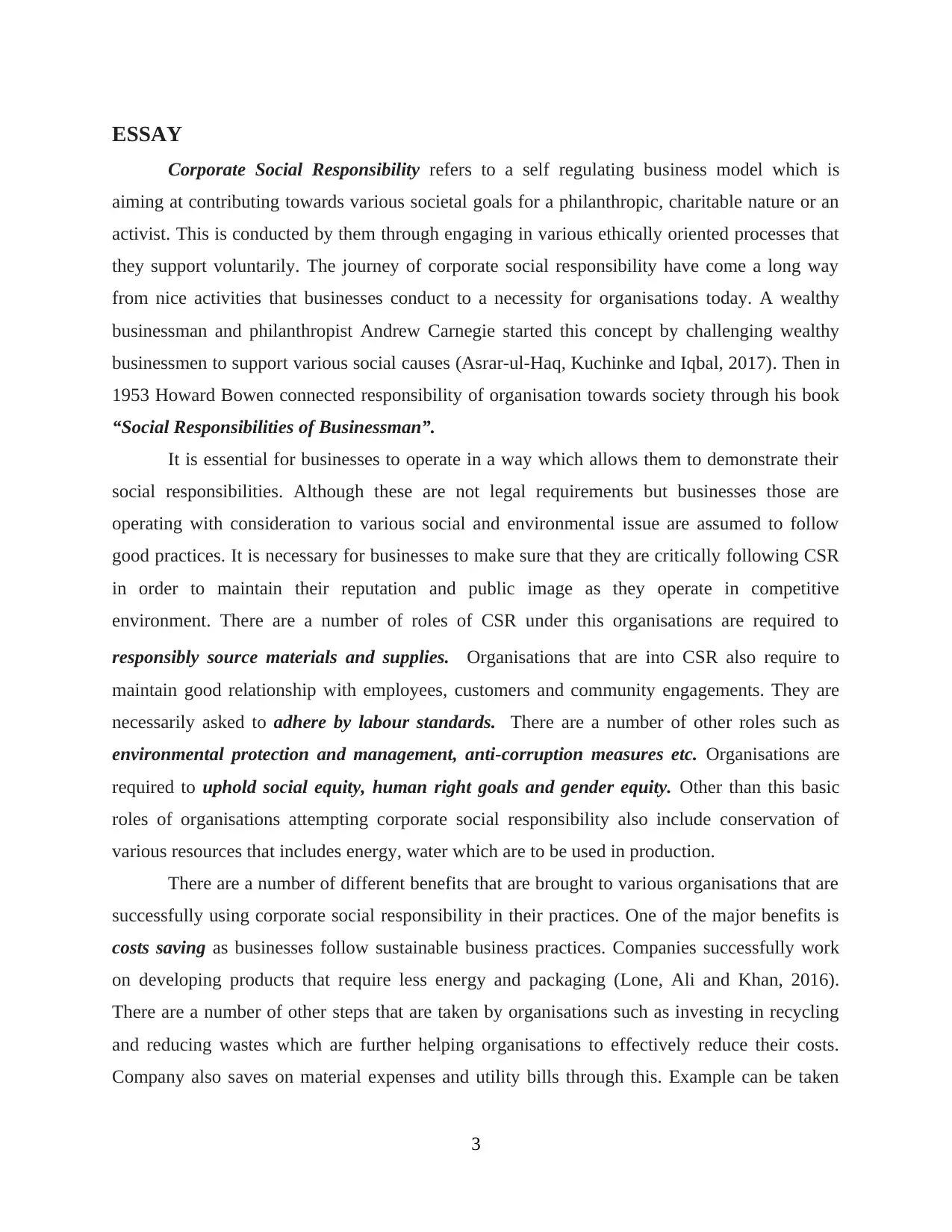
ESSAY
Corporate Social Responsibility refers to a self regulating business model which is
aiming at contributing towards various societal goals for a philanthropic, charitable nature or an
activist. This is conducted by them through engaging in various ethically oriented processes that
they support voluntarily. The journey of corporate social responsibility have come a long way
from nice activities that businesses conduct to a necessity for organisations today. A wealthy
businessman and philanthropist Andrew Carnegie started this concept by challenging wealthy
businessmen to support various social causes (Asrar-ul-Haq, Kuchinke and Iqbal, 2017). Then in
1953 Howard Bowen connected responsibility of organisation towards society through his book
“Social Responsibilities of Businessman”.
It is essential for businesses to operate in a way which allows them to demonstrate their
social responsibilities. Although these are not legal requirements but businesses those are
operating with consideration to various social and environmental issue are assumed to follow
good practices. It is necessary for businesses to make sure that they are critically following CSR
in order to maintain their reputation and public image as they operate in competitive
environment. There are a number of roles of CSR under this organisations are required to
responsibly source materials and supplies. Organisations that are into CSR also require to
maintain good relationship with employees, customers and community engagements. They are
necessarily asked to adhere by labour standards. There are a number of other roles such as
environmental protection and management, anti-corruption measures etc. Organisations are
required to uphold social equity, human right goals and gender equity. Other than this basic
roles of organisations attempting corporate social responsibility also include conservation of
various resources that includes energy, water which are to be used in production.
There are a number of different benefits that are brought to various organisations that are
successfully using corporate social responsibility in their practices. One of the major benefits is
costs saving as businesses follow sustainable business practices. Companies successfully work
on developing products that require less energy and packaging (Lone, Ali and Khan, 2016).
There are a number of other steps that are taken by organisations such as investing in recycling
and reducing wastes which are further helping organisations to effectively reduce their costs.
Company also saves on material expenses and utility bills through this. Example can be taken
3
Corporate Social Responsibility refers to a self regulating business model which is
aiming at contributing towards various societal goals for a philanthropic, charitable nature or an
activist. This is conducted by them through engaging in various ethically oriented processes that
they support voluntarily. The journey of corporate social responsibility have come a long way
from nice activities that businesses conduct to a necessity for organisations today. A wealthy
businessman and philanthropist Andrew Carnegie started this concept by challenging wealthy
businessmen to support various social causes (Asrar-ul-Haq, Kuchinke and Iqbal, 2017). Then in
1953 Howard Bowen connected responsibility of organisation towards society through his book
“Social Responsibilities of Businessman”.
It is essential for businesses to operate in a way which allows them to demonstrate their
social responsibilities. Although these are not legal requirements but businesses those are
operating with consideration to various social and environmental issue are assumed to follow
good practices. It is necessary for businesses to make sure that they are critically following CSR
in order to maintain their reputation and public image as they operate in competitive
environment. There are a number of roles of CSR under this organisations are required to
responsibly source materials and supplies. Organisations that are into CSR also require to
maintain good relationship with employees, customers and community engagements. They are
necessarily asked to adhere by labour standards. There are a number of other roles such as
environmental protection and management, anti-corruption measures etc. Organisations are
required to uphold social equity, human right goals and gender equity. Other than this basic
roles of organisations attempting corporate social responsibility also include conservation of
various resources that includes energy, water which are to be used in production.
There are a number of different benefits that are brought to various organisations that are
successfully using corporate social responsibility in their practices. One of the major benefits is
costs saving as businesses follow sustainable business practices. Companies successfully work
on developing products that require less energy and packaging (Lone, Ali and Khan, 2016).
There are a number of other steps that are taken by organisations such as investing in recycling
and reducing wastes which are further helping organisations to effectively reduce their costs.
Company also saves on material expenses and utility bills through this. Example can be taken
3
⊘ This is a preview!⊘
Do you want full access?
Subscribe today to unlock all pages.

Trusted by 1+ million students worldwide
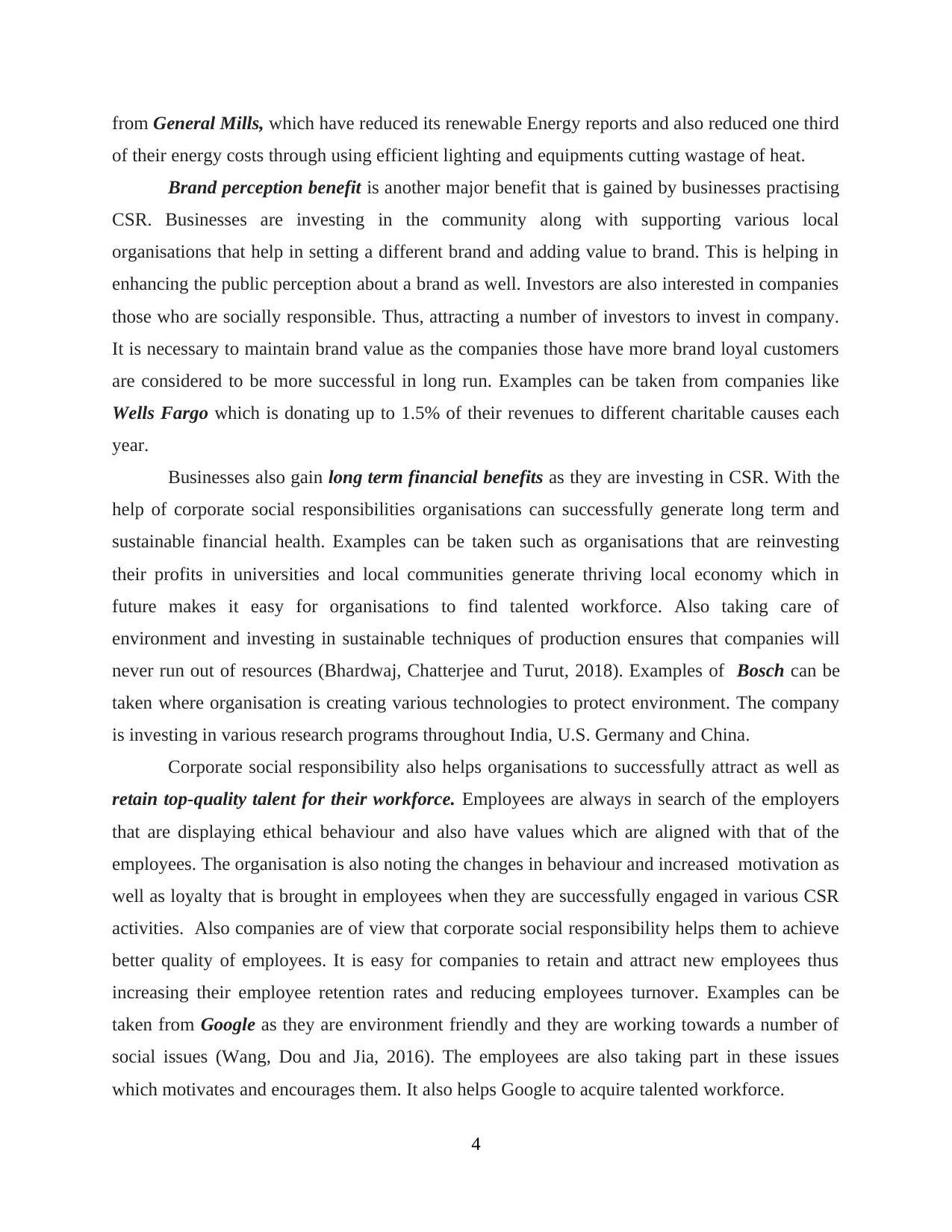
from General Mills, which have reduced its renewable Energy reports and also reduced one third
of their energy costs through using efficient lighting and equipments cutting wastage of heat.
Brand perception benefit is another major benefit that is gained by businesses practising
CSR. Businesses are investing in the community along with supporting various local
organisations that help in setting a different brand and adding value to brand. This is helping in
enhancing the public perception about a brand as well. Investors are also interested in companies
those who are socially responsible. Thus, attracting a number of investors to invest in company.
It is necessary to maintain brand value as the companies those have more brand loyal customers
are considered to be more successful in long run. Examples can be taken from companies like
Wells Fargo which is donating up to 1.5% of their revenues to different charitable causes each
year.
Businesses also gain long term financial benefits as they are investing in CSR. With the
help of corporate social responsibilities organisations can successfully generate long term and
sustainable financial health. Examples can be taken such as organisations that are reinvesting
their profits in universities and local communities generate thriving local economy which in
future makes it easy for organisations to find talented workforce. Also taking care of
environment and investing in sustainable techniques of production ensures that companies will
never run out of resources (Bhardwaj, Chatterjee and Turut, 2018). Examples of Bosch can be
taken where organisation is creating various technologies to protect environment. The company
is investing in various research programs throughout India, U.S. Germany and China.
Corporate social responsibility also helps organisations to successfully attract as well as
retain top-quality talent for their workforce. Employees are always in search of the employers
that are displaying ethical behaviour and also have values which are aligned with that of the
employees. The organisation is also noting the changes in behaviour and increased motivation as
well as loyalty that is brought in employees when they are successfully engaged in various CSR
activities. Also companies are of view that corporate social responsibility helps them to achieve
better quality of employees. It is easy for companies to retain and attract new employees thus
increasing their employee retention rates and reducing employees turnover. Examples can be
taken from Google as they are environment friendly and they are working towards a number of
social issues (Wang, Dou and Jia, 2016). The employees are also taking part in these issues
which motivates and encourages them. It also helps Google to acquire talented workforce.
4
of their energy costs through using efficient lighting and equipments cutting wastage of heat.
Brand perception benefit is another major benefit that is gained by businesses practising
CSR. Businesses are investing in the community along with supporting various local
organisations that help in setting a different brand and adding value to brand. This is helping in
enhancing the public perception about a brand as well. Investors are also interested in companies
those who are socially responsible. Thus, attracting a number of investors to invest in company.
It is necessary to maintain brand value as the companies those have more brand loyal customers
are considered to be more successful in long run. Examples can be taken from companies like
Wells Fargo which is donating up to 1.5% of their revenues to different charitable causes each
year.
Businesses also gain long term financial benefits as they are investing in CSR. With the
help of corporate social responsibilities organisations can successfully generate long term and
sustainable financial health. Examples can be taken such as organisations that are reinvesting
their profits in universities and local communities generate thriving local economy which in
future makes it easy for organisations to find talented workforce. Also taking care of
environment and investing in sustainable techniques of production ensures that companies will
never run out of resources (Bhardwaj, Chatterjee and Turut, 2018). Examples of Bosch can be
taken where organisation is creating various technologies to protect environment. The company
is investing in various research programs throughout India, U.S. Germany and China.
Corporate social responsibility also helps organisations to successfully attract as well as
retain top-quality talent for their workforce. Employees are always in search of the employers
that are displaying ethical behaviour and also have values which are aligned with that of the
employees. The organisation is also noting the changes in behaviour and increased motivation as
well as loyalty that is brought in employees when they are successfully engaged in various CSR
activities. Also companies are of view that corporate social responsibility helps them to achieve
better quality of employees. It is easy for companies to retain and attract new employees thus
increasing their employee retention rates and reducing employees turnover. Examples can be
taken from Google as they are environment friendly and they are working towards a number of
social issues (Wang, Dou and Jia, 2016). The employees are also taking part in these issues
which motivates and encourages them. It also helps Google to acquire talented workforce.
4
Paraphrase This Document
Need a fresh take? Get an instant paraphrase of this document with our AI Paraphraser
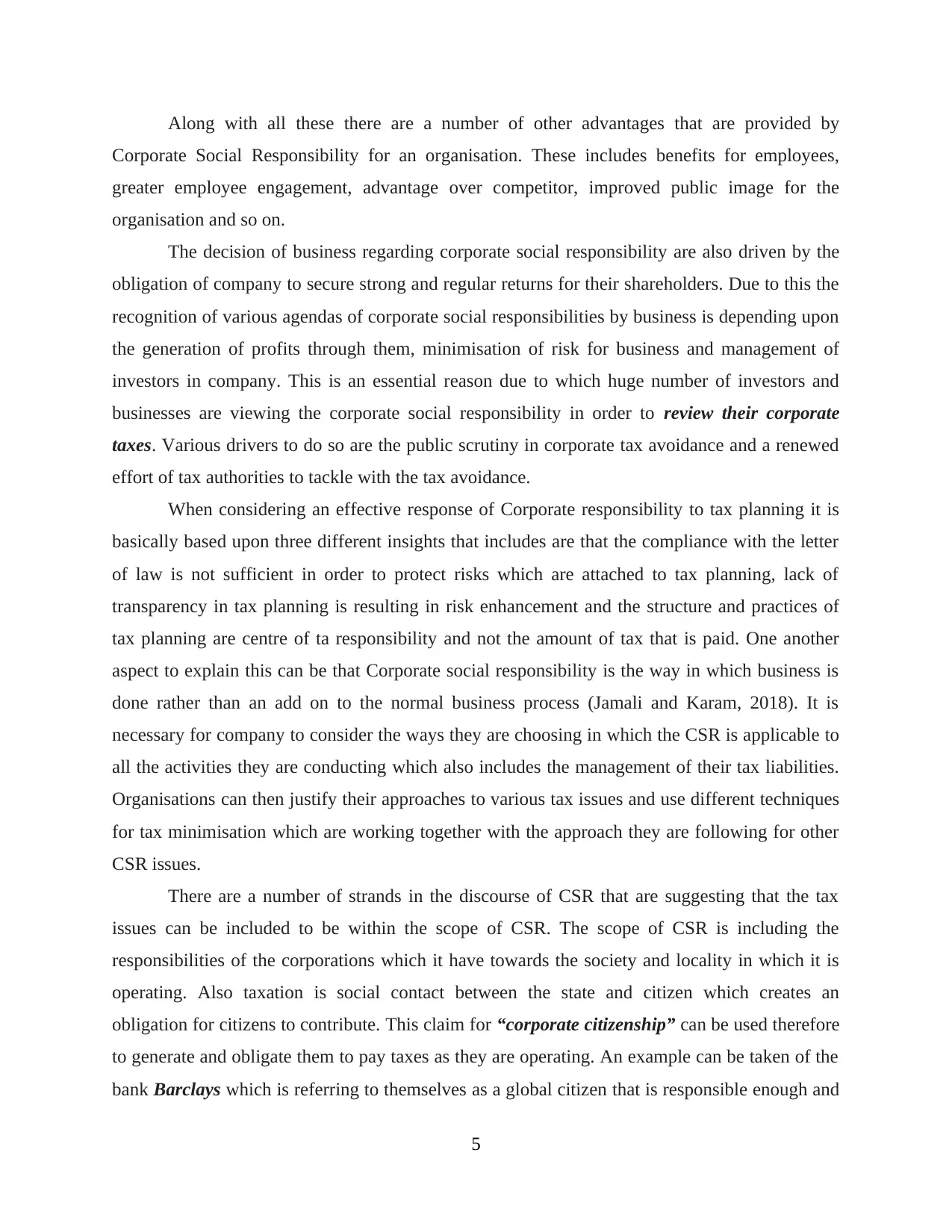
Along with all these there are a number of other advantages that are provided by
Corporate Social Responsibility for an organisation. These includes benefits for employees,
greater employee engagement, advantage over competitor, improved public image for the
organisation and so on.
The decision of business regarding corporate social responsibility are also driven by the
obligation of company to secure strong and regular returns for their shareholders. Due to this the
recognition of various agendas of corporate social responsibilities by business is depending upon
the generation of profits through them, minimisation of risk for business and management of
investors in company. This is an essential reason due to which huge number of investors and
businesses are viewing the corporate social responsibility in order to review their corporate
taxes. Various drivers to do so are the public scrutiny in corporate tax avoidance and a renewed
effort of tax authorities to tackle with the tax avoidance.
When considering an effective response of Corporate responsibility to tax planning it is
basically based upon three different insights that includes are that the compliance with the letter
of law is not sufficient in order to protect risks which are attached to tax planning, lack of
transparency in tax planning is resulting in risk enhancement and the structure and practices of
tax planning are centre of ta responsibility and not the amount of tax that is paid. One another
aspect to explain this can be that Corporate social responsibility is the way in which business is
done rather than an add on to the normal business process (Jamali and Karam, 2018). It is
necessary for company to consider the ways they are choosing in which the CSR is applicable to
all the activities they are conducting which also includes the management of their tax liabilities.
Organisations can then justify their approaches to various tax issues and use different techniques
for tax minimisation which are working together with the approach they are following for other
CSR issues.
There are a number of strands in the discourse of CSR that are suggesting that the tax
issues can be included to be within the scope of CSR. The scope of CSR is including the
responsibilities of the corporations which it have towards the society and locality in which it is
operating. Also taxation is social contact between the state and citizen which creates an
obligation for citizens to contribute. This claim for “corporate citizenship” can be used therefore
to generate and obligate them to pay taxes as they are operating. An example can be taken of the
bank Barclays which is referring to themselves as a global citizen that is responsible enough and
5
Corporate Social Responsibility for an organisation. These includes benefits for employees,
greater employee engagement, advantage over competitor, improved public image for the
organisation and so on.
The decision of business regarding corporate social responsibility are also driven by the
obligation of company to secure strong and regular returns for their shareholders. Due to this the
recognition of various agendas of corporate social responsibilities by business is depending upon
the generation of profits through them, minimisation of risk for business and management of
investors in company. This is an essential reason due to which huge number of investors and
businesses are viewing the corporate social responsibility in order to review their corporate
taxes. Various drivers to do so are the public scrutiny in corporate tax avoidance and a renewed
effort of tax authorities to tackle with the tax avoidance.
When considering an effective response of Corporate responsibility to tax planning it is
basically based upon three different insights that includes are that the compliance with the letter
of law is not sufficient in order to protect risks which are attached to tax planning, lack of
transparency in tax planning is resulting in risk enhancement and the structure and practices of
tax planning are centre of ta responsibility and not the amount of tax that is paid. One another
aspect to explain this can be that Corporate social responsibility is the way in which business is
done rather than an add on to the normal business process (Jamali and Karam, 2018). It is
necessary for company to consider the ways they are choosing in which the CSR is applicable to
all the activities they are conducting which also includes the management of their tax liabilities.
Organisations can then justify their approaches to various tax issues and use different techniques
for tax minimisation which are working together with the approach they are following for other
CSR issues.
There are a number of strands in the discourse of CSR that are suggesting that the tax
issues can be included to be within the scope of CSR. The scope of CSR is including the
responsibilities of the corporations which it have towards the society and locality in which it is
operating. Also taxation is social contact between the state and citizen which creates an
obligation for citizens to contribute. This claim for “corporate citizenship” can be used therefore
to generate and obligate them to pay taxes as they are operating. An example can be taken of the
bank Barclays which is referring to themselves as a global citizen that is responsible enough and
5
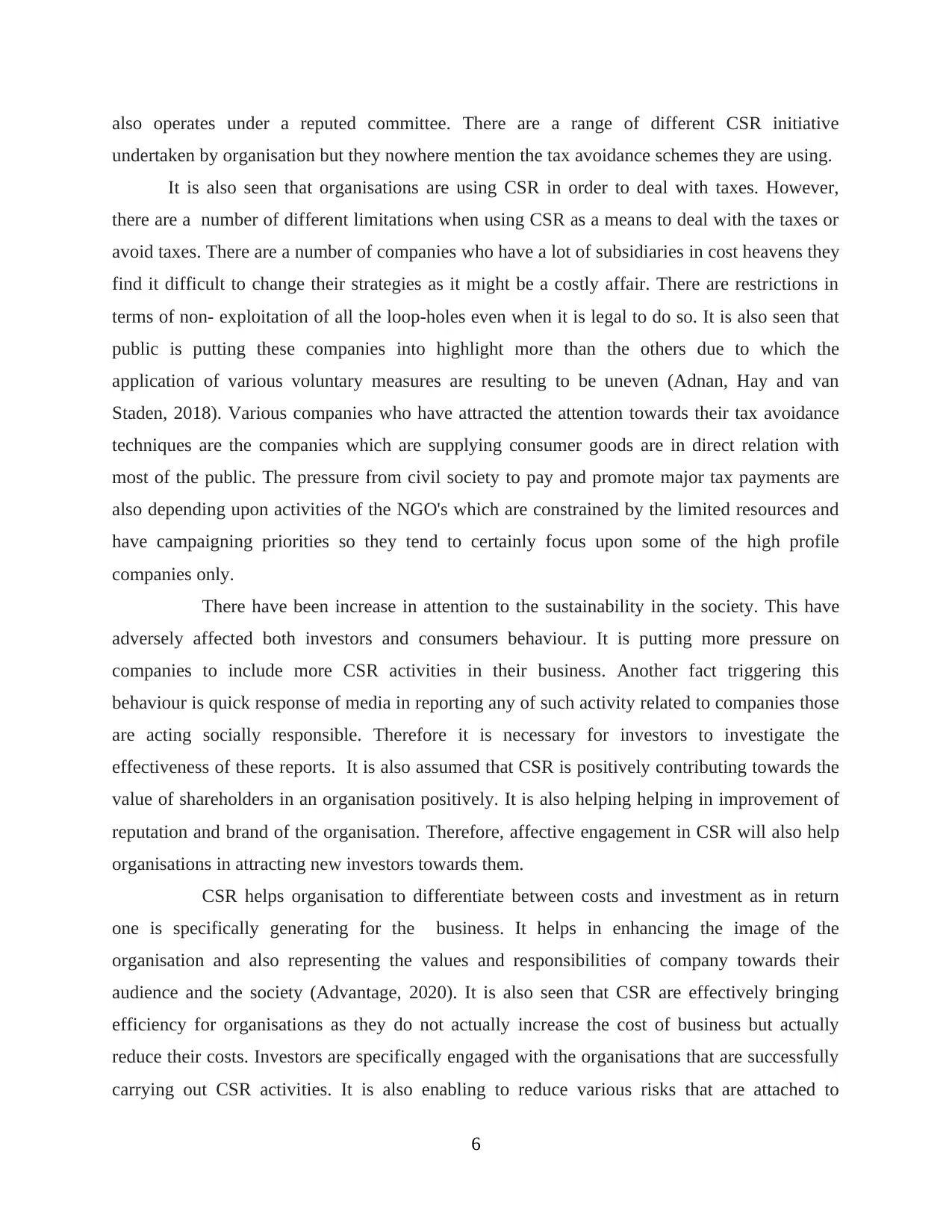
also operates under a reputed committee. There are a range of different CSR initiative
undertaken by organisation but they nowhere mention the tax avoidance schemes they are using.
It is also seen that organisations are using CSR in order to deal with taxes. However,
there are a number of different limitations when using CSR as a means to deal with the taxes or
avoid taxes. There are a number of companies who have a lot of subsidiaries in cost heavens they
find it difficult to change their strategies as it might be a costly affair. There are restrictions in
terms of non- exploitation of all the loop-holes even when it is legal to do so. It is also seen that
public is putting these companies into highlight more than the others due to which the
application of various voluntary measures are resulting to be uneven (Adnan, Hay and van
Staden, 2018). Various companies who have attracted the attention towards their tax avoidance
techniques are the companies which are supplying consumer goods are in direct relation with
most of the public. The pressure from civil society to pay and promote major tax payments are
also depending upon activities of the NGO's which are constrained by the limited resources and
have campaigning priorities so they tend to certainly focus upon some of the high profile
companies only.
There have been increase in attention to the sustainability in the society. This have
adversely affected both investors and consumers behaviour. It is putting more pressure on
companies to include more CSR activities in their business. Another fact triggering this
behaviour is quick response of media in reporting any of such activity related to companies those
are acting socially responsible. Therefore it is necessary for investors to investigate the
effectiveness of these reports. It is also assumed that CSR is positively contributing towards the
value of shareholders in an organisation positively. It is also helping helping in improvement of
reputation and brand of the organisation. Therefore, affective engagement in CSR will also help
organisations in attracting new investors towards them.
CSR helps organisation to differentiate between costs and investment as in return
one is specifically generating for the business. It helps in enhancing the image of the
organisation and also representing the values and responsibilities of company towards their
audience and the society (Advantage, 2020). It is also seen that CSR are effectively bringing
efficiency for organisations as they do not actually increase the cost of business but actually
reduce their costs. Investors are specifically engaged with the organisations that are successfully
carrying out CSR activities. It is also enabling to reduce various risks that are attached to
6
undertaken by organisation but they nowhere mention the tax avoidance schemes they are using.
It is also seen that organisations are using CSR in order to deal with taxes. However,
there are a number of different limitations when using CSR as a means to deal with the taxes or
avoid taxes. There are a number of companies who have a lot of subsidiaries in cost heavens they
find it difficult to change their strategies as it might be a costly affair. There are restrictions in
terms of non- exploitation of all the loop-holes even when it is legal to do so. It is also seen that
public is putting these companies into highlight more than the others due to which the
application of various voluntary measures are resulting to be uneven (Adnan, Hay and van
Staden, 2018). Various companies who have attracted the attention towards their tax avoidance
techniques are the companies which are supplying consumer goods are in direct relation with
most of the public. The pressure from civil society to pay and promote major tax payments are
also depending upon activities of the NGO's which are constrained by the limited resources and
have campaigning priorities so they tend to certainly focus upon some of the high profile
companies only.
There have been increase in attention to the sustainability in the society. This have
adversely affected both investors and consumers behaviour. It is putting more pressure on
companies to include more CSR activities in their business. Another fact triggering this
behaviour is quick response of media in reporting any of such activity related to companies those
are acting socially responsible. Therefore it is necessary for investors to investigate the
effectiveness of these reports. It is also assumed that CSR is positively contributing towards the
value of shareholders in an organisation positively. It is also helping helping in improvement of
reputation and brand of the organisation. Therefore, affective engagement in CSR will also help
organisations in attracting new investors towards them.
CSR helps organisation to differentiate between costs and investment as in return
one is specifically generating for the business. It helps in enhancing the image of the
organisation and also representing the values and responsibilities of company towards their
audience and the society (Advantage, 2020). It is also seen that CSR are effectively bringing
efficiency for organisations as they do not actually increase the cost of business but actually
reduce their costs. Investors are specifically engaged with the organisations that are successfully
carrying out CSR activities. It is also enabling to reduce various risks that are attached to
6
⊘ This is a preview!⊘
Do you want full access?
Subscribe today to unlock all pages.

Trusted by 1+ million students worldwide
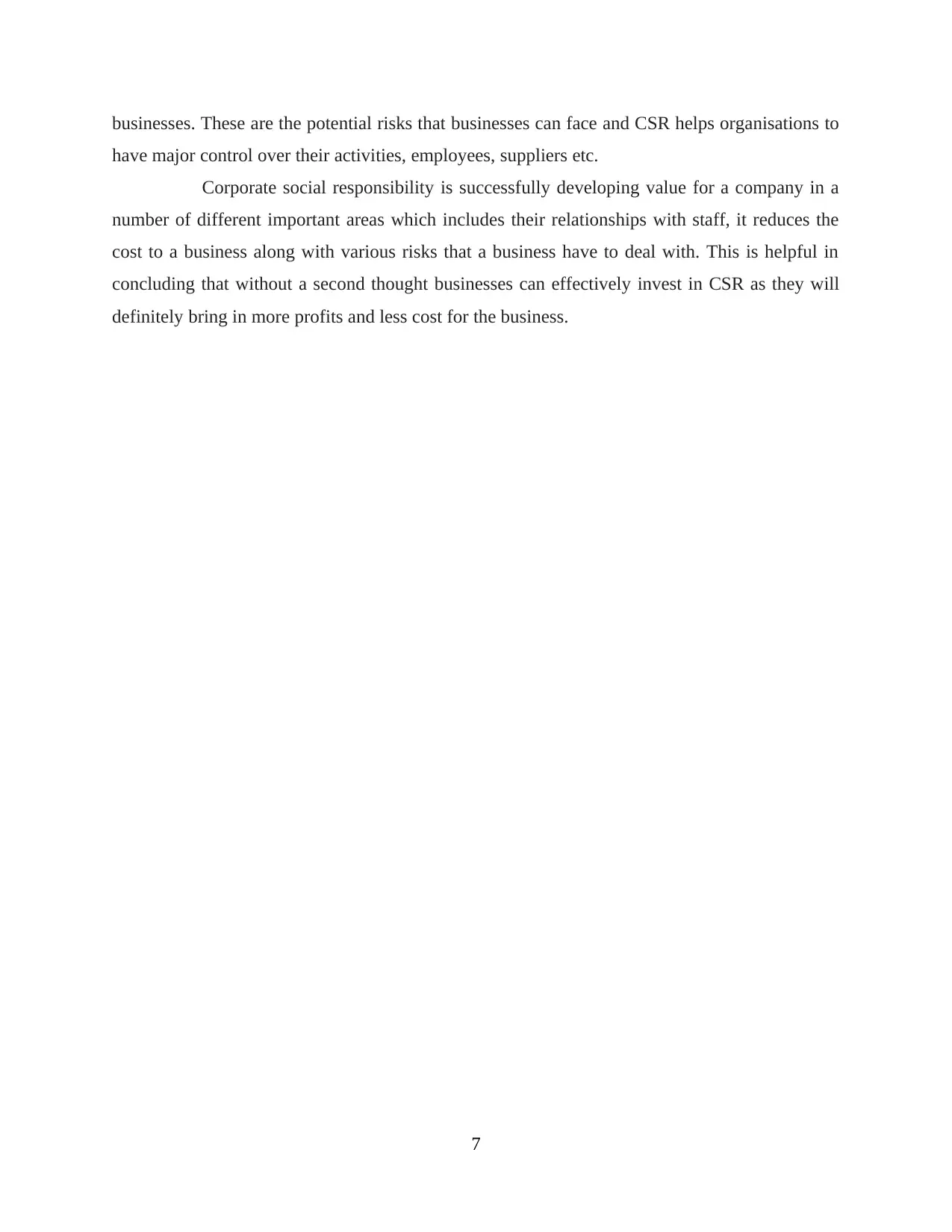
businesses. These are the potential risks that businesses can face and CSR helps organisations to
have major control over their activities, employees, suppliers etc.
Corporate social responsibility is successfully developing value for a company in a
number of different important areas which includes their relationships with staff, it reduces the
cost to a business along with various risks that a business have to deal with. This is helpful in
concluding that without a second thought businesses can effectively invest in CSR as they will
definitely bring in more profits and less cost for the business.
7
have major control over their activities, employees, suppliers etc.
Corporate social responsibility is successfully developing value for a company in a
number of different important areas which includes their relationships with staff, it reduces the
cost to a business along with various risks that a business have to deal with. This is helpful in
concluding that without a second thought businesses can effectively invest in CSR as they will
definitely bring in more profits and less cost for the business.
7
Paraphrase This Document
Need a fresh take? Get an instant paraphrase of this document with our AI Paraphraser
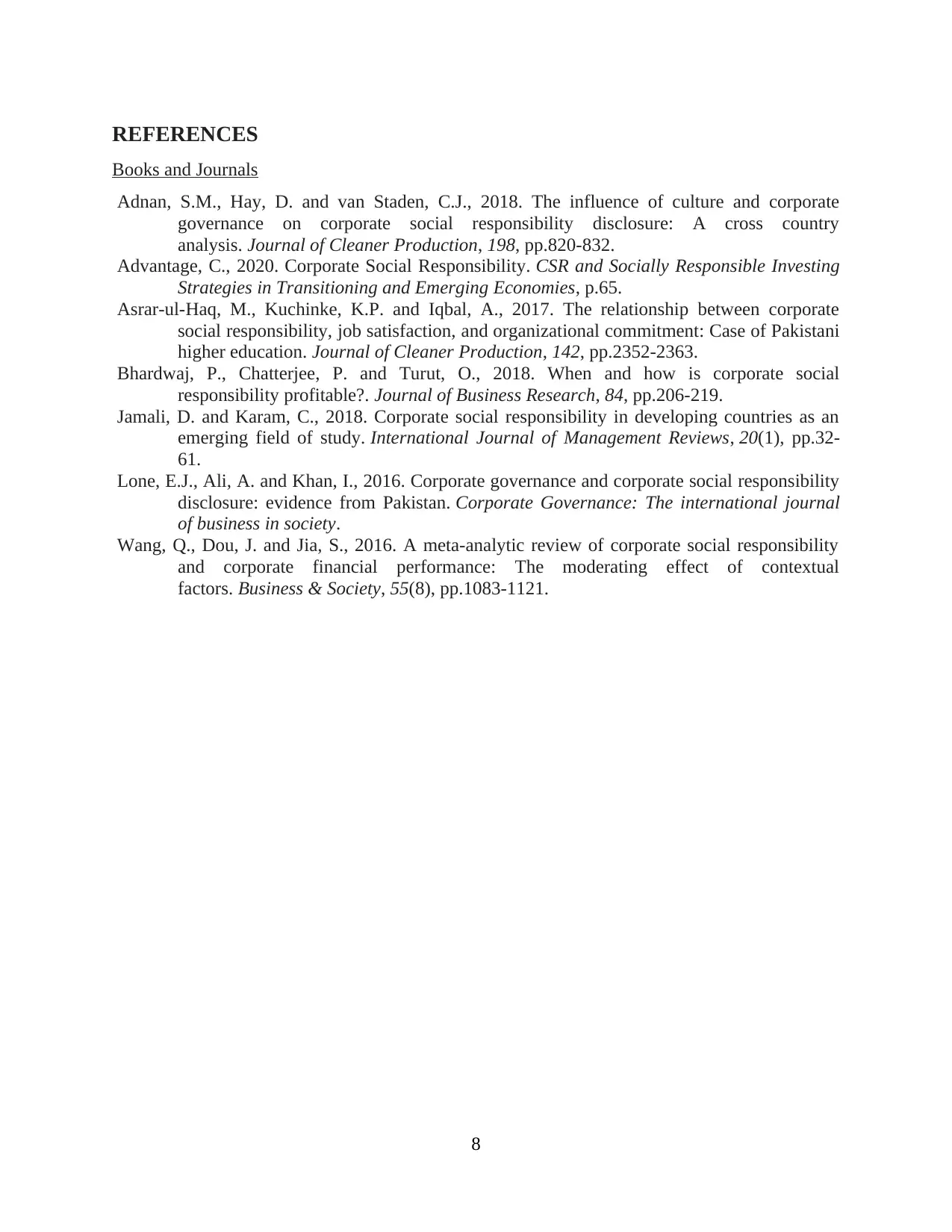
REFERENCES
Books and Journals
Adnan, S.M., Hay, D. and van Staden, C.J., 2018. The influence of culture and corporate
governance on corporate social responsibility disclosure: A cross country
analysis. Journal of Cleaner Production, 198, pp.820-832.
Advantage, C., 2020. Corporate Social Responsibility. CSR and Socially Responsible Investing
Strategies in Transitioning and Emerging Economies, p.65.
Asrar-ul-Haq, M., Kuchinke, K.P. and Iqbal, A., 2017. The relationship between corporate
social responsibility, job satisfaction, and organizational commitment: Case of Pakistani
higher education. Journal of Cleaner Production, 142, pp.2352-2363.
Bhardwaj, P., Chatterjee, P. and Turut, O., 2018. When and how is corporate social
responsibility profitable?. Journal of Business Research, 84, pp.206-219.
Jamali, D. and Karam, C., 2018. Corporate social responsibility in developing countries as an
emerging field of study. International Journal of Management Reviews, 20(1), pp.32-
61.
Lone, E.J., Ali, A. and Khan, I., 2016. Corporate governance and corporate social responsibility
disclosure: evidence from Pakistan. Corporate Governance: The international journal
of business in society.
Wang, Q., Dou, J. and Jia, S., 2016. A meta-analytic review of corporate social responsibility
and corporate financial performance: The moderating effect of contextual
factors. Business & Society, 55(8), pp.1083-1121.
8
Books and Journals
Adnan, S.M., Hay, D. and van Staden, C.J., 2018. The influence of culture and corporate
governance on corporate social responsibility disclosure: A cross country
analysis. Journal of Cleaner Production, 198, pp.820-832.
Advantage, C., 2020. Corporate Social Responsibility. CSR and Socially Responsible Investing
Strategies in Transitioning and Emerging Economies, p.65.
Asrar-ul-Haq, M., Kuchinke, K.P. and Iqbal, A., 2017. The relationship between corporate
social responsibility, job satisfaction, and organizational commitment: Case of Pakistani
higher education. Journal of Cleaner Production, 142, pp.2352-2363.
Bhardwaj, P., Chatterjee, P. and Turut, O., 2018. When and how is corporate social
responsibility profitable?. Journal of Business Research, 84, pp.206-219.
Jamali, D. and Karam, C., 2018. Corporate social responsibility in developing countries as an
emerging field of study. International Journal of Management Reviews, 20(1), pp.32-
61.
Lone, E.J., Ali, A. and Khan, I., 2016. Corporate governance and corporate social responsibility
disclosure: evidence from Pakistan. Corporate Governance: The international journal
of business in society.
Wang, Q., Dou, J. and Jia, S., 2016. A meta-analytic review of corporate social responsibility
and corporate financial performance: The moderating effect of contextual
factors. Business & Society, 55(8), pp.1083-1121.
8
1 out of 8
Related Documents
Your All-in-One AI-Powered Toolkit for Academic Success.
+13062052269
info@desklib.com
Available 24*7 on WhatsApp / Email
![[object Object]](/_next/static/media/star-bottom.7253800d.svg)
Unlock your academic potential
Copyright © 2020–2026 A2Z Services. All Rights Reserved. Developed and managed by ZUCOL.





